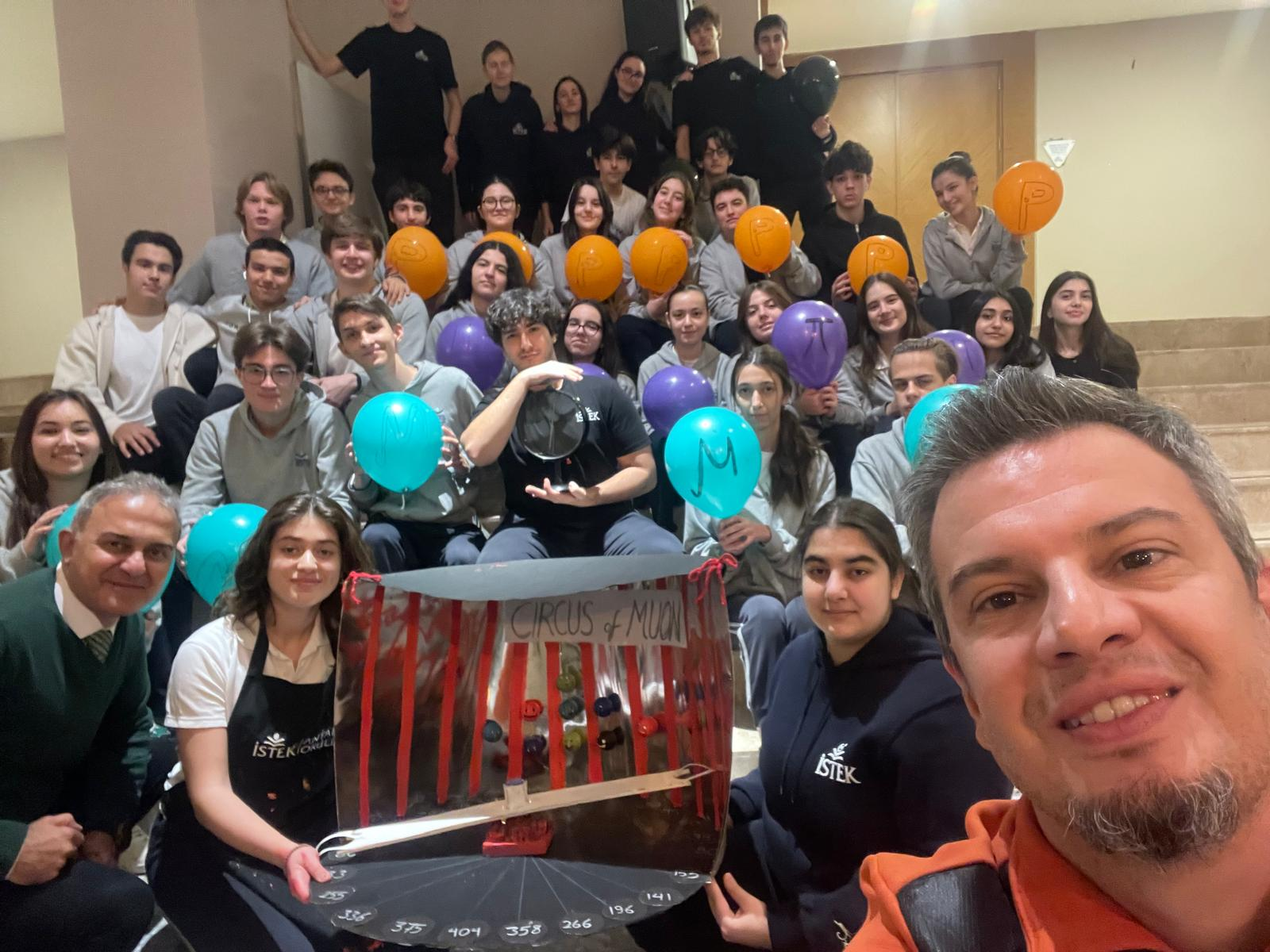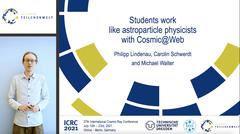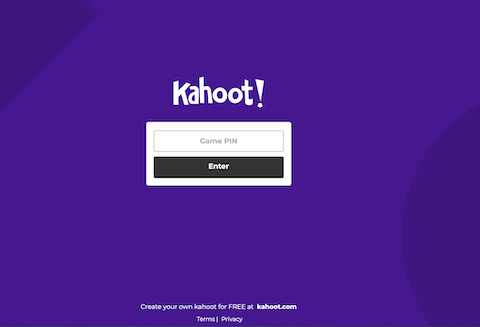Activities
Each participating group will plan its own event. Events may include activities such as cosmic particle discussions, news about the latest research, or even direct measurement and/or data analysis of cosmic particles. The following formats can be used:
- Lectures
- Masterclasses or Masterclasses@home
- Video broadcast to the classroom
- Assignments that students can complete at school or at home
On this page you will find some ideas for different activities for your event. We will also announce events that all people from around the world can attend, such as lectures via livestream. Feel free to suggest activities as well. There are no limits to your ideas.
At the end of the day, it would be great if you could summarize your work during the day and your findings on cosmic rays in a proceeding (see Organisation). We will include your contribution in a booklet and make it available to all participants.
Video Calls
We organise Video Calls where groups can share their results and findings. In the Video Calls, students can present their results to each other, ask each other questions, and discuss new findings. For more information, see the Organisation section (Registration required for access).
Online Introductions
Live Streams
International Cosmic Day at the MAGIC telescopes
MAGIC telescopes are perfect instruments to study very-high-energetic gamma rays and cosmic rays. Come to visit us and see how this works! Our MAGICian Irene Burelli will be in connection from the Roque de Los Muchachos Observatory, where MAGIC telescopes are located.
Time: 12:30 CET (11:30 UTC )
Facebook event: https://www.facebook.com/events/1842870486322322
Youtube streaming: https://www.youtube.com/watch?v=lVmkrSt17MA
X/twitter streaming: @MAGICtelescopes
Lecture by University of Łódź
Was Einstein right? Is the speed of light independent of its wavelength?
Time: 13:00 CET to 13:30 CET (12:00 to 12:30 UTC)
https://teams.microsoft.com/meet/3580924455464?p=uWznPJ9EZ2KoepTIjU
We also offer different types of data analysis for different tools and projects:
Data Analysis with Cosmic@Web
On the Cosmic@Web learning platform, we make public cosmic-ray data available, along with background information, descriptions of the experiments, explanations of the data sets, and hints on how to interpret them. For more details, see the Cosmic@Web tutorial. Also take a look at our contribution to the 36th and 37th International Cosmic Ray Conferences:
And check out the Cosmic@Web video from 2021:
Data Analysis by OCRA
The INFN OCRA collaboration provides a series of online activities for cosmic ray data analysis on its webpage (only available in Italian): https://web.infn.it/OCRA/in-laboratorio-con-noi/. After an introduction on various techniques for the detection of cosmic rays with experiments on the Earth, a laboratory section offers the possibility to analyse the data of real experiments, from educational activities like a cosmic ray telescope located in a Naples metro station to data from experiments dedicated to frontier research, like the Auger observatory in the Argentinian pampa.
Data Analysis by EEE Project
The EEE Project collaboration prepared an analysis activity on the data collected both by the POLA-R detector located at Ny Alesund (Svalbard, Norway) and by some EEE telescopes installed in Italian High Schools. For this ICD edition the EEE students will be engaged in the analysis of the data collected during the intense Solar Flare on May 10th 2024. During the day, together with presentations by cosmic rays experts, students will present the results of the analyses. More information at https://agenda.centrofermi.it/event/256/.
Data Analysis with KCDC
KCDC (KASCADE Cosmic Ray Data Centre) is a public data centre for high-energy astroparticle physics based on the data of the KASCADE experiment. KCDC offers a wide range of resources, including the outreach ones. The tutorials and examples at KCDC’s website represent a compilation of interesting lessons within the vast field of cosmic radiation to illustrate the processes within and outside of our atmosphere by means of the data sets of the KASCADE experiment. On the KCDC's JupyterLab one can find some tutorials, based on KASCADE, TRVO and and IceCube data samples. For more details, see the KCDC analysis instruction:
In between, get creative with one of our contests and take part in a Kahoot! quiz:
Drawing contest
Draw the Universe Through Your Eyes! Send your artwork directly to icd@desy.de. If you like, share it on social media with the hashtag #InternationalCosmicDay. The most creative entry will win a prize! Submission deadline: November 23, 2025
2024 DAISY SAINATO FROM TROPEA created this picture and won:
Selfie contest
Science in Action – Show Your Best Selfie! Take part in our Selfie Contest and show us how you bring science to life! Send your most creative selfie directly to icd@desy.de. If you like, share it on social media with the hashtag #InternationalCosmicDay. The most creative entry will win a prize! Submission deadline: November 23, 2025
2024 ISTEK ANTALYA LARA SCHOOLS won the price with this picture:

Quiz
As every year, we will offer a Kahoot quiz. On the day of the ICD we will publish the access code for the Kahoot here. Test your knowledge against opponents worldwide!
Are you ready to dive into the fascinating world of cosmic particles? Join us for an exciting Kahoot Quiz designed to challenge and expand your understanding of these mysterious messengers from space. We’ve got not one, but two Kahoot quizzes this year! Code: 05705088 and 05094768. Let's see who will be the world's best expert on cosmic particles!
Booklet
As at a real scientific conference, all contributions will be documented in writing afterwards. Write your proceeding about your work and results on cosmic rays. We will bundle all proceedings in a booklet and make it available to you. More information will be available after Registration.






